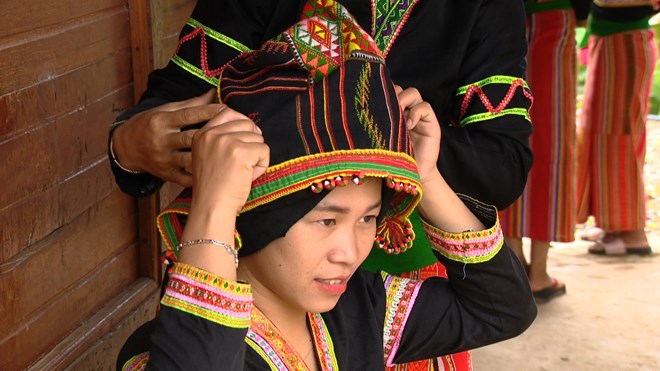.jpg)
The Cong ethnic group in Muong Te district, the northern mountainous province of Lai Chau, is one of the most disadvantaged ethnic minorities in Vietnam, but the group boasts a diverse cultural life with traditional values.
.jpg)
A class teaching Cong ethnic group's folk culture in Nam Khao
commune, Muong Te district, Lai Chau province (Photo: VNA)
Over the years, with the Party and State’s support, local authorities have
worked to preserve cultural identity of their group, which has around 1,500
people, living mainly in Nam Khao and Nam Cha communes in Muong Te and Nam Nhun
districts.
There are classes where the elderly people have been teaching the group’s
melodies and dances to young people as a way to preserve their distinctive
culture.
Ly Thi Giong, among six artisans in Nam Khao commune, is
considered a living treasure in helping preserve the traditional folk art of
the Cong ethnic minority, especially for younger generations.
"Every day, I call young girls to practice dances in a hope to
stop Cong cultural identity from falling into oblivion,” said Giong.
"In the past, we had to equip by ourselves with paraffin lambs and
wood canes for practicing. Now it is more convenient as we are equipped by the
authorities with electricity and loudspeakers,” Giong told Vietnam News Agency.

Local young girls are preparing their traditional costumes before
a class (Photo: VNA)
Besides helping resettled people stabilise production life since
2014, local authorities of Nam Khao commune have worked hard to maintain these
classes in an attempt to preserve the traditional cultural values of the Cong
ethnic minority group.
Ly Van Hieu, Chairman of the Nam Khao communal People’s Committee
said the commune has six art troupes for six villages with each one being
provided with six million VND a year and having one artisan for preserving
traditional culture.
"In the future, we hope that the State will pay more attention to
providing assistance for classes and artisans who can participate in preserving
the traditional cultural values of ethnic minorities such as Sin La, Cong,
Mang, La Hu to younger generations,” said the chairman.
The traditional cultural values of ethnic minorities are precious
heritages, contributing to a diverse but united Vietnamese culture. However,
the widespread pervasion of foreign cultures has posed challenges for local
authorities in preserving cultural identity.
Given that, upholding and promoting traditional cultural values of
ethnic minorities is an urgent mission. To that end, classes and art troupes
passing down folk culture to younger generations need to be multiplied so that
culture is nurtured and can maximise its internal strength.
Source: VNA
Hoa Binh province has carried out multiple programmes and initiatives to revive its cultural heritage which has gradually fallen into oblivion through the ebbs and flows of history.
The most prominent and defining feature in the prehistoric era of Hoa Binh is the Hoa Binh Culture. The Culture was first discovered in Hoa Binh. The significant prehistoric culture represents not only Vietnam but also Southeast Asia and southern China. Through excavations of cave sites in the limestone regions of Hoa Binh, French archaeologist M. Colani introduced the world to a "Stone Age in Hoa Binh province – Northern Vietnam" in 1927. On January 30, 1932, the First Congress of Far Eastern Prehistorians, held in Hanoi, officially recognised the Hoa Binh Culture.
Known as the "Land of Epic History”, Hoa Binh province, the gateway to Vietnam’s northwest, boasts a strategic location and a unique cultural tapestry woven by its ethnic minority communities.
The People's Committee of Luong Son District recently held a ceremony to receive the certificate recognizing Sau Communal House in Thanh Cao Commune as a provincial-level historical and cultural site.
Recognising the importance of cultural heritage preservation in protecting and promoting the value system of Vietnamese culture, and serving socio-economic development in the new period, Party committees and local administrations in Hoa Binh province have identified it as a key task in the cultural development strategy. The province has been making efforts in mobilising resources, creating consensus among people and engaging ethnic communities in preserving and promoting cultural identity.
Hoa Binh province has captured growing attention both domestically and internationally for its distinctive cultural heritage and rich history. Most notably, it has been renowned for its famous Hoa Binh culture, considered the cradle of ancient Vietnamese civilisation. Looking ahead to significant milestones in 2025 and the 140th anniversary of province establishment in 2026, Hoa Binh Newspaper presents a comprehensive overview of the province's development across economic, social, cultural, tourism, and security domains.


.jpg)
.jpg)
